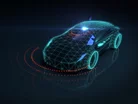Wayve and Microsoft scaling AI for self-driving cars

Autonomous vehicle start up, Wayve, has partnered with Microsoft to leverage the supercomputing infrastructure needed to support the development of AI-based models for autonomous vehicles (AVs) on a global scale.
Working together the two companies will use Wayve's expertise using deep neural networks and vast quantities of data to train AI models with Microsoft’s engineering in powering large-scale AI systems.
Mark Russinovich, CTO, Azure at Microsoft said: “Supercomputing capabilities are key to processing the immense amount of data required for the simulation, validation, and training of AI models that enable safe and secure autonomous driving. Wayve is combining its expertise in deep learning-based autonomous vehicle systems with Microsoft Azure computing power to bring self-driving transportation experiences to more people and organisations faster.”
This announcement follows Microsoft’s participation in Wayve's US$200mn Series B investment round. It also extends their existing collaboration, which commenced in 2020, when Wayve chose Microsoft Azure to help accelerate the development of its technology.
Collaborating with Microsoft to further develop deep learning
Together, they aim to unlock the power of deep learning systems for autonomy, which holds the promise of being able to scale faster to new places than rules-based approaches. When designed around Wayve's unique approach, the power of Microsoft's supercomputing infrastructure will make it possible to bring self-driving technology to more places and customers sooner.
Alex Kendall, CEO of Wayve said: “Joining forces with Microsoft to design the supercomputing infrastructure needed to accelerate deep learning for autonomous mobility is an opportunity that we are honoured to lead. Deep learning systems thrive on data, and we’ve put an immense amount of effort into understanding what it takes to get these systems on the road. We are excited by the opportunities that this collaboration will create as we push deep learning to new levels of scale.”
Supporting widespread deployment of the technology
Founded in 2017, Wayve is on a mission to reimagine autonomous mobility through embodied intelligence.
According to the company, it is the first to deploy autonomous vehicles on public roads with end-to-end deep learning. Made up of a global team of experts in machine learning and robotics from top organisations around the world, the Wayve team is headquartered in London with their fleet of vehicles testing in cities across the UK. Wayve aims to be the first to deploy autonomy in 100 cities.
Wayve tested its autonomous driving system across five new UK cities last year and showed it could perform the same driving skills it learned in London without any prior city-specific adaptations. Developing AVs that generalise can unlock new markets faster and support more widespread deployment of this technology.
This ability to ‘generalise’ has attracted two of the UK’s largest grocery retailers, Asda and Ocado Group, to trial Wayve's AV technology as part of their last-mile delivery operations in London.
The commercial pilots will see Wayve's technology fitted onto a selection of delivery vans that will be deployed on a diverse array of urban delivery routes. The autonomous vans will also provide fleet-scale data for training Wayve's AI models. Beyond its grocery delivery partners, Wayve is also working with DPD, the UK’s leading parcel delivery firm, to collect additional driving data from DPD vans operating daily across Greater London.


